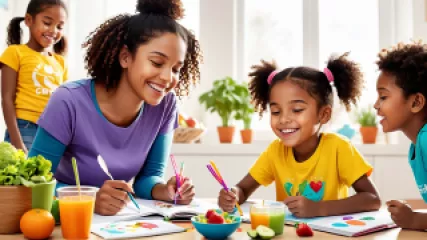Top 10 Activities for Building Resilience in Kids
Building resilience in children is essential for their overall well-being and future success. Resilience helps children navigate through life's challenges, bounce back from setbacks, and develop the necessary skills to cope with stress and adversity. As parents and caregivers, we play a crucial role in fostering resilience in kids.
In this article, we have compiled a list of the top 10 activities that can help build resilience in children. These activities are designed to promote emotional intelligence, problem-solving skills, self-confidence, and positive coping mechanisms. Let's dive in!
1. Encourage Emotional Expression
Emotional expression is a vital aspect of building resilience in children. Encourage your child to express their emotions in a healthy and constructive manner. Create a safe and non-judgmental space where they can freely share their feelings. Teach them different ways to express emotions, such as talking, writing in a journal, or engaging in creative activities like drawing or painting.
2. Teach Problem-Solving Skills
Teaching children problem-solving skills equips them with the tools they need to tackle challenges effectively. Encourage your child to identify problems, brainstorm possible solutions, evaluate each solution, and choose the best one. Engage in problem-solving discussions and provide guidance when needed. This will empower them to face obstacles head-on and develop resilience.
3. Foster a Growth Mindset
A growth mindset is the belief that abilities and intelligence can be developed through dedication and hard work. Encourage your child to adopt a growth mindset by praising their efforts and persistence rather than focusing solely on achievements. Help them understand that mistakes and failures are opportunities for learning and growth. This mindset cultivates resilience by teaching children to embrace challenges and persevere in the face of obstacles.
4. Promote Healthy Risk-Taking
Encourage your child to step out of their comfort zone and take healthy risks. This can include trying new activities, participating in sports or clubs, or speaking up in social situations. By taking calculated risks, children learn to overcome fear, develop confidence, and build resilience. Support them throughout the process and celebrate their efforts, regardless of the outcome.
5. Foster Social Connections
Strong social connections are crucial for building resilience in children. Encourage your child to develop and maintain positive relationships with peers, family members, and mentors. Engage in activities that promote social interaction, such as playdates, team sports, or community events. These connections provide emotional support, a sense of belonging, and opportunities for growth.
6. Teach Healthy Coping Mechanisms
Teaching children healthy coping mechanisms equips them with effective strategies to manage stress and adversity. Encourage your child to engage in activities that help them relax and unwind, such as deep breathing exercises, mindfulness, yoga, or engaging in hobbies they enjoy. By developing healthy coping mechanisms, children learn to regulate their emotions and bounce back from challenging situations.
7. Encourage Responsibility and Independence
Encouraging responsibility and independence in children fosters resilience by teaching them to take ownership of their actions and decisions. Assign age-appropriate tasks and chores that allow them to contribute to the family or community. This helps build self-confidence, problem-solving skills, and a sense of responsibility. Gradually increase their independence, allowing them to make choices and learn from their experiences.
8. Cultivate Gratitude
Practicing gratitude is a powerful tool for building resilience in children. Encourage your child to express gratitude for the things they have, the experiences they enjoy, and the people in their lives. Foster a culture of appreciation by regularly discussing what they are grateful for as a family. This cultivates a positive outlook, resilience, and an ability to find joy even in difficult times.
9. Promote Self-Care
Teaching children the importance of self-care is crucial for their mental and emotional well-being. Encourage your child to prioritize self-care activities, such as getting enough sleep, eating nutritious food, staying physically active, and engaging in activities they enjoy. By taking care of themselves, children develop a strong foundation for resilience.
10. Lead by Example
One of the most effective ways to build resilience in children is by leading by example. Model resilience in your own life by demonstrating healthy coping mechanisms, problem-solving skills, and a positive mindset. Show them that setbacks and challenges are a natural part of life and can be overcome with determination and perseverance. Your actions speak louder than words, and children learn resilience by observing and emulating those around them.
Building resilience in children is a lifelong journey that requires patience, consistency, and support. By incorporating these activities into your child's daily life, you can help them develop the skills they need to navigate challenges and thrive.
Remember, each child is unique, and it's important to tailor these activities to their individual needs and preferences. Celebrate their progress and provide a nurturing environment that encourages them to grow and develop resilience.
Together, we can empower the next generation with the tools they need to overcome adversity and lead fulfilling lives.






